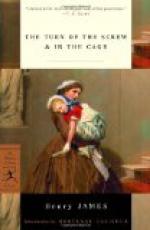She saw her in fact, and only ten days later; but this time not alone, and that was exactly a part of the luck of it. Not unaware—as how could her observation have left her so?—of the possibilities through which it could range, our young lady had ever since had in her mind a dozen conflicting theories about Everard’s type; as to which, the instant they came into the place, she felt the point settled with a thump that seemed somehow addressed straight to her heart. That organ literally beat faster at the approach of the gentleman who was this time with Cissy, and who, as seen from within the cage, became on the spot the happiest of the happy circumstances with which her mind had invested the friend of Fritz and Gussy. He was a very happy circumstance indeed as, with his cigarette in his lips and his broken familiar talk caught by his companion, he put down the half-dozen telegrams it would take them together several minutes to dispatch. And here it occurred, oddly enough, that if, shortly before the girl’s interest in his companion had sharpened her sense for the messages then transmitted, her immediate vision of himself had the effect, while she counted his seventy words, of preventing intelligibility. His words were mere numbers, they told her nothing whatever; and after he had gone she was in possession of no name, of no address, of no meaning, of nothing but a vague sweet sound and an immense impression. He had been there but five minutes, he had smoked in her face, and, busy with his telegrams, with the tapping pencil and the conscious danger, the odious betrayal that would come from a mistake, she had had no wandering glances nor roundabout arts to spare. Yet she had taken him in; she knew everything; she had made up her mind.
He had come back from Paris; everything was re-arranged; the pair were again shoulder to shoulder in their high encounter with life, their large and complicated game. The fine soundless pulse of this game was in the air for our young woman while they remained in the shop. While they remained? They remained all day; their presence continued and abode with her, was in everything she did till nightfall, in the thousands of other words she counted, she transmitted, in all the stamps she detached and the letters she weighed and the change she gave, equally unconscious and unerring in each of these particulars, and not, as the run on the little office thickened with the afternoon hours, looking up at a single ugly face in the long sequence, nor really hearing the stupid questions that she patiently and perfectly answered. All patience was possible now, all questions were stupid after his, all faces were ugly. She had been sure she should see the lady again; and even now she should perhaps, she should probably, see her often. But for him it was totally different; she should never never see him. She wanted it too much. There was a kind of wanting that helped—she had arrived, with her rich experience, at that generalisation; and there was another kind that was fatal. It was this time the fatal kind; it would prevent.




